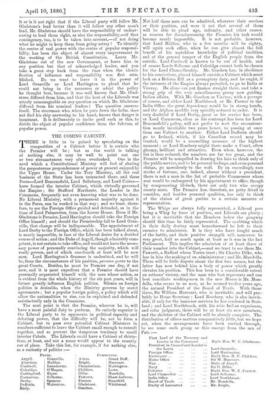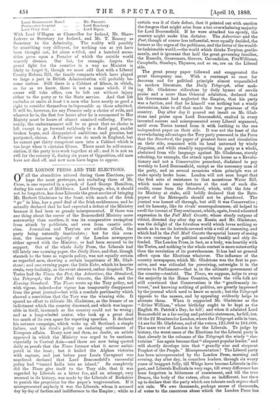THE COMING CABINET.
THERE is little to be gained by speculating on the composition of a Cabinet before it is certain who the Premier will be ; but as the world is talking of nothing else, it may be well to point out one
or two circumstances very often overlooked. One is the need which a Constitutional Ministry will feel of abating the preposterous preponderance of power at present enjoyed by the Upper House. Under the Tory Ministry, all the real business of the State has been transacted there, and three Peers—Lord Beaconsfield, Lord Salisbury, and Lord Cairns— have formed the interior Cabinet, which virtually governed the Empire ; Sir Stafford Northcote, the Leader in the Commons, frequently not even knowing what was to be done. No Liberal Ministry, with a permanent majority against it in the Peers, can be worked in that way; and we trust, there- fore, to see the Foreign Office guided and defended, as in the time of Lord Palmerston, from the Lower House. Even if Mr. Gladstone is Premier, Lord Hartington should take the Foreign Office himself ; and should the Premiership fall to Lord Gran- ville, that change will be indispensable. The appointment of Lord Derby to the Foreign Office, which has been talked about, is nearly impossible, in face of the Liberal desire for a decided course of action ; and the Duke of Argyll, though admirably com- petent, is not certain to take office, and would not have the neces- sary power of personally convincing the majority, which will really govern, and of which one-fourth at least will be new men. Lord Hartington's firmness is undoubted, and he will be, from the circumstances of his position, persona grata to the great Courts. Besides, he must be Premier one day, if not now, and it is most expedient that a Premier should have personally acquainted himself with the men whose action, as is evident from the whole history of the six past years, will in future greatly influence English politics. Silence on foreign politics is desirable, when the Ministry governs by secret agreements ; but a popular foreign policy, a policy which will allow the nationalities to rise, can be explained and defended satisfactorily only in the Commons.
The next point is that the Premier, whoever he is, will have a most painful duty to perform. So entirely superior is the Liberal party to its opponents in political capacity and debating power, that the difficulty will be, not to form a Cabinet, but to pass over potential Cabinet Ministers in numbers sufficient to leave the Cabinet small enough to consult together, and so prevent the dangerous tendency to small interior Cabals. The Liberals could have a Cabinet of thirty- four, at least, and not a name would appear to the country out of place. Take this list, for example, if for nothing else, as a curiosity of politics :—
PEERS. COMMONERS.
Argyll. Granville. ; Adam. Grant Duff.
Aberdare. Halifax. Bright. Harcourt.
Card well. Lansdowne. Chamberlain. Hartington.
Coleridge. O'Hagan. I Childers. Lowe.
Carlingford. Ripon. I Dilke. Mundella. Carnarvon. Selborne. i; Fawcett. Shaw-Lefevre. Derby. Spencer. Forster. Stansfeld. Dofferin. Wolverton. Gladstone. Whitbread.
Emly. I Goschen. Not half these men can be admitted, whatever their services or their position, and were it not that several of them will be able to plead age, infirmity, and other causes, as reasons for disembarrassing the Premier, his task would become nearly impossible. It is not probable, however, that Lord Halifax, who in a few months will be eighty, will again seek office, when be can give almost the full benefit of his matchless knowledge of political tradition and of the general temper of the English people from the outside. Lord Cardwell is known to be out of health, and of course Lords Selborne and Coleridge cannot both be chosen for the Lord Chancellorship. Mr. Goschen has, in obedience to his convictions, placed himself outside a Cabinet which must look on a Reform Rill as a peremptory duty, and he ought, if the interests of the Empire always prevailed, to go to India as Viceroy. He alone can put finance straight there, and take a strong grip of the very miscellaneous group now guiding Indian affairs. With Mr. Goschen as Viceroy, with a peerage of course, and either Lord Northbrook or Mr. Forster in the India Office. the great dependency would be in strong hands, and the Afghan muddle very speedily reduced to order. It is very doubtful if Lord Derby, great as his service has been, or Lord Carnarvon, clear as his contempt has been for Lord Beaconsfield's policy, will not prefer to wait the reconstruc- tion nearly inevitable two years hence, to passing at once from one Cabinet to another. Either Lord Dufferin should go to Ireland, which, if his Canadian record may be trusted, would be a reconciling measure of the highest moment ; or Lord Rosebery might there make a Court, often gloomy, brilliant and attractive. Even when, however, the list is thus reduced, the numbers are far too great, and the Premier will be compelled in drawing his lists to think only of the public service, and to let personal feelings, and even personal claims, go mercilessly to the wall. By an exceedingly rare stroke of fortune, one, indeed, almost without a precedent, there is not a man in the list of probable Commoners whose seat would be endangered by his appointment to office, though by compensating ill-luck, there are only two who occupy county seats. The Premier has, therefore, no petty detail to consider, and besides personal qualities, has only to think of the claims of great parties to a certain measure of representation.
The Whigs are always fully represented, a Liberal peer being a Whig by force of position, and Liberals are plenty ; but it is inevitable that the Members below the gangway should this time be fairly represented. The snubbing which is their daily destiny must henceforward be left to their enemies to administer. It is they who have fought much. of the battle, and their positive stre,ngth will, moreover, be- very great, half as much again at least as it was in the last Parliament. This implies the admission of at least three of their number into the Cabinet,—and we trust to see there Mr. Fawcett, a Radical whom Tories trust ; Sir Charles Dilke, who has in him the making of an administrator ; and Mr. Mundella. There will be little dispute about the first two names, but the latter has now behind him a body of power which greatly elevates his position. This has been to a considerable extent an artisans' victory, and the man who best represents and can best conciliate working-men in the new House is Mr. Mun- della, who seems to us now, as he seemed twelve years ago, the natural President of the Board of Trade. With those three, Sir William Harcourt, who is inevitable, and will pro- bably be Home Secretary ; Lord Rosebery, who is also inevit- able, if only for the immense services he has rendered in Scot- land ; and Lord Northbrook, with his wide Indian experience, and calm judgment, there will be at least six new members, and the skeleton of the Cabinet will be already complete. The distribution of offices matters comparatively little, but we hope yet, when the arrangements have been carried through, to see some such group as this emerge from the urn of Fate :- First Lord of the Treasury and Leader in the Commons ... President in Council and Leader in the Lords ... ... ...
Foreign Office ... ...
Exchequer ... ... ... ...
Home Office ... ... ...
War .. ... ... ... ...
Navy ... ... ... ...
Colonies ... ... ...
Lord Chancellor ... ...
India Office ... ... ...
Board of Trade ... ...
Duchy of Lancaster ... ... Right Hon. W. E. Gladstone.
Lord Granville.
Lord Hartington.
Right Hon. H. C. Childers.
Sir W. Harcourt.
Duke of Argyll.
Sir C. Dilke.
Right Hon. W. E .Forster.
Lord Selborne.
Lord Northbrook.
Mr. Mundella.
Mr. Bright. Local Government Board ... Mr. Fawcett.
Postm aster- General ... ... Lord Rosebery.
Lord Privy Seal ... Lord Ripon.
With Lord O'Hagan as Chancellor for Ireland, Mr. Shaw- Lefevre as Secretary for Ireland, and Mr. T. Brassey as
Secretary to the Admiralty. The reality will possibly be something very different, for nothing can as yet have been thought out, let alone settled, and a hundred neces- sities press upon a Premier of which the outside world scarcely dreams. Our list, for example, forgets the grand fight for the counties in a way no Minister is likely to forget it, though we must add that with a Liberal County Reform Bill, the family compacts which have played so large a part in British Adminstration will probably be- come useless. Still there is a Cabinet of fifteen, in which, so far as we know, there is not a name which, if its owner will take office, can be left out without injury either to the party or to the State service. And that list excludes or omits at least -On men who have nearly as good a right to consider themselves indispensable as those admitted. It will be, however, for any Premier only a choice of evils, and whoever he is, the first few hours after he is summoned to Her Majesty must be hours of almost unmixed suffering. Fortu- nately, the embarrassment will be so great that no choice is left except to go forward ruthlessly to a fixed goal, amidst broken hopes, and disappointed ambitions, and genuine, but postponed, claims. A Premier can do much in England, but he cannot put thirty competent men into a Cabinet which is too large when it contains fifteen. There must be self-renun- ciation, if the party is to work together at all ; and it is not an evil for the country if, during six years of Opposition, old men have not died off, and new men have begun to appear.



































 Previous page
Previous page